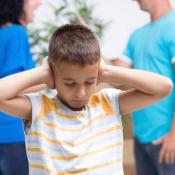 When children experience abuse, abandonment, or other deep hurts, the adults in their lives may not know how to help them. Many people believe topics like psychological healing only belong to the professionals. But “professionals,” however helpful they may be, do not have enough time to impact children in the same way as those who are involved with them daily.
When children experience abuse, abandonment, or other deep hurts, the adults in their lives may not know how to help them. Many people believe topics like psychological healing only belong to the professionals. But “professionals,” however helpful they may be, do not have enough time to impact children in the same way as those who are involved with them daily.
This article is meant to help parents and caregivers support the children, adolescents, and even adults in their lives who are overcoming the damage caused by an abusive relationship or other types of trauma.
1. Teach Your Child to Talk
It is important to remember two words when working with anyone experiencing trauma and hurt: “hope” and “encouragement.” This isn’t about telling someone they should paint over all their problems with happy thoughts. Instead, it is about offering a way out from the despair left over from trauma.
Talk to your child about what happened. There is no way to manage trauma without at least acknowledging that it happened. Most people are raised in homes where no one talks about “the elephant in the room.” But if you want to help a person heal from any type of hurt or trauma, it is important to discuss it.
Once you begin talking about difficult subjects, you give your child permission to as well. You are teaching them it is okay to talk about these things.
2. The ‘Trauma Narrative’
One useful tool for healing is the “trauma narrative.” It is a book created by a child, sometimes with the help of an adult, that tells the story of what happened. Each page shows a scene in the “drama,” with the climax being where the worst part of the trauma occurred. If the child has complex trauma involving many different types of abuse, including emotional abuse, the story could be written without a climax but include different pieces of what happened.
Once you begin talking about difficult subjects, you give your child permission to as well. You are teaching them it is okay to talk about these things.
Helping a child create their trauma narrative by drawing different pictures and writing about the steps leading up to significant events can be very therapeutic. Once the book is complete, sitting down with the child and reading it helps them continue to process through feelings associated with the events and helps them overcome the effects of the trauma.
3. Teach Your Child to Trust Themselves
Children are often impressionable. It is so easy to teach a child that they cannot trust themselves. Particularly in abusive homes, children are taught not to feel or to think on their own. They are usually taught to do what their parent says without question and to overlook their own experiences.
Teaching a child to trust their intuition is not overly difficult, though it often takes time. Start by having a discussion with your child about how important it is to trust one’s own inner voice, or conscience. Continue asking your child how they feel about certain experiences. This act will help your child learn that to look inside is an important aspect of life.
4. Show Your Child How to Grieve
Most children (and really, most adults) are not taught how to grieve. Most people are taught “Don’t cry,” “Keep difficult emotions to yourself,” “Be strong,” “Move on,” and other similar methods of coping with loss. When working with emotionally injured children, you can best help them by not only teaching them how to talk about their feelings, but also about how to grieve.
How do you do this? There are a couple of ways:
- One is through personal example. Here, you demonstrate your own grief about something.
- Another is when you ask your child questions, such as, “What do you miss about so-and-so?” Or, “If you could talk to so-and-so, what would you say?” Try to ask open-ended questions that generate feelings.
Grieving involves processing through feelings until they are complete. Children need not analyze this concept. They just need permission to talk, cry, be angry, and express their emotions until they are done. Grief is finished when it’s finished. There is no timeline for grief, and everyone processes emotions on their own schedule. Talk to your child about these concepts and give them permission to “process” through any feelings at their own pace.
5. Teach Your Child About Boundaries
One important topic you can introduce to your child is the concept of boundaries. Boundaries can be physical and emotional. Physical boundaries include a person’s body and physical space. Emotional boundaries include how a person is treated emotionally, mentally, and psychologically.
Art is one effective intervention for teaching children this concept. You can draw a picture of a line, wall, or some type of boundary indicator. On one side of the line, write down attributes of healthy boundaries, such as, “respect,” or “does not touch me in a way that is unsafe.” On the “boundary violation” side of the barrier, write a list of unhealthy boundary violators, such as “name calling,” or “yelling.” You and your child can create this drawing together.
Of course, you will need to use age-appropriate language. The main concern is to teach your child emotional intelligence and about how to protect themselves from unsafe relationships.
6. Identify the ‘Hurt Self’ and the ‘Strong Self’
Teach your child that it is okay to talk about difficult memories. Explain that they have a “hurt self” that needs to be healed. In addition, let your child know they aren’t only hurt, but that they also have a “healthy self” or “strong self” capable of overcoming hard things. The strong self will help heal the hurt self.
When working with emotionally injured children, it helps to not only teach them how to talk about their feelings, but to teach them how to grieve.
To help your child identify what is hurt, you can ask questions about thoughts, fears, feelings, and dreams. See if your child can identify how they experience the pain from the trauma they have endured. If your child is not interested in going that deep, just talk to them. Say, “I know you are hurt. Here are some suggestions for helping yourself heal.”
It is helpful for parents and other significant leaders in a child’s life to learn how to teach them important life lessons, especially those involving emotions. Since most people generally do not understand emotional health, this can prove challenging—mainly, because most people haven’t been taught themselves.
I recommend drawing two pictures for your child: one a hurt child, and one a healthy child. The hurt child could look sad and have tears. The strong child could look steadfast and concerned. Teach your child that these two “parts of self” exist within them, and that their job is to learn how to nurture and heal the hurt part of the self.
7. Identify Hurting Beliefs and Healing Beliefs
Help your child identify things they tell themselves about life or personal identity. Beliefs children often have when hurt tend to be very personalized; beliefs such as, “I am unlovable,” “The world is not safe,” or “I will never be happy again.” Any type of negative, devaluing belief can be ingrained in a child’s head for years, decades, or even a lifetime. It is beneficial to help your child identify these beliefs early on.
Have your child write down a list of unhealthy beliefs. Some include thoughts such as, “If I were a better child, my mother would not be on drugs,” “If I were thinner, my friend would not have rejected me,” or “I need to be a perfect student to have a good life.” If your child is old enough, work with them to identify unhealthy beliefs.
Once these unhealthy thoughts have been identified, make a list of helpful, healing beliefs for your child to replace the unhealthy thoughts. After this, remind your child to replace the unhealthy beliefs with the healthy beliefs. Make sure they understand this process is building an essential inner recovery “muscle” and will require practice to develop.
References:
- Chara, K. A., & Chara, P. J. (2006). A safe place for Caleb. London, England: Jessica Kingsley Publishers.
- James, J. (2017). The grief recovery handbook, 20th anniversary expanded ed.: The action program for moving beyond death, divorce, and other losses including health, career, and faith. New York, NY: Harper-Collins.
- Trauma narratives. (n.d.). Retrieved from: https://www.therapistaid.com/therapy-guide/trauma-narratives

The preceding article was solely written by the author named above. Any views and opinions expressed are not necessarily shared by GoodTherapy.org. Questions or concerns about the preceding article can be directed to the author or posted as a comment below.

 Different Faces of Trauma: My Journey to Heal from Childhood Wounds
Different Faces of Trauma: My Journey to Heal from Childhood Wounds How Can Parents Lessen Traumatic Effects of Divorce on Children?
How Can Parents Lessen Traumatic Effects of Divorce on Children? Conquering the Pain: Therapy and Childhood Trauma Survival
Conquering the Pain: Therapy and Childhood Trauma Survival

Please fill out all required fields to submit your message.
Invalid Email Address.
Please confirm that you are human.
Leave a Comment
By commenting you acknowledge acceptance of GoodTherapy.org's Terms and Conditions of Use.